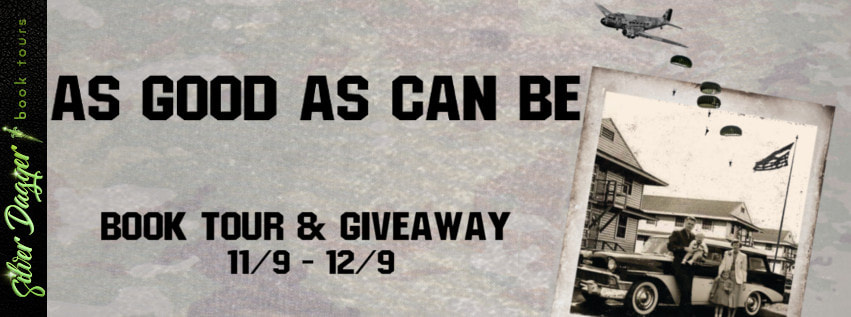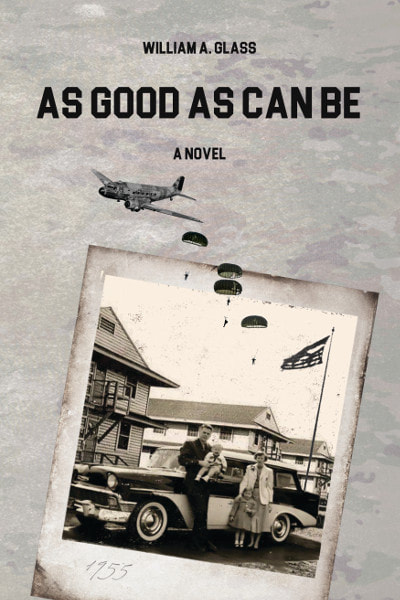EXCERPT
from As Good As Can Be a novel by William A. Glass
Dave Knight is on his toes peering through a playroom
window at the snow. It fell overnight, but there are already tracks in the
fresh powder. They lead to the shallow end of the swimming pool. Several
servants have gathered there, and now Dave sees why. “Uh-oh, Haji fell into the
pool again,” he exclaims.
“Let me see,” Melissa says, shoving
Dave aside. Haji Baba is her donkey, and she watches with concern as two
houseboys cling to his tail. The driver, Mahmoud, is partway on the ice holding
the animal’s neck. “Stupid donkey,” Melissa says. “Now he’s stuck.” She allows
the curtain to close and goes out.
Soon Melissa is back holding a
Coca-Cola bottle. “This is for you,” she says and gives the drink to Dave. He
takes a swallow and immediately gags. As he regurgitates his breakfast, Dave’s
nurse, Farah, rushes over and looks at what’s left of the drink. “You give
brother soap water,” she says to Melissa. “Bad girl.” Farah spins Melissa
around and gives her two bops on the behind. Then she takes Dave on her hip and
carries him down the hall to the master bedroom.
Lieutenant Colonel David S. Knight
Jr. answers Farah’s knock. He belts his uniform jacket while listening to Farah
describe what Melissa did. Then the officer wrinkles his nose. “What’s that
smell?” he asks.
“He throw up,” Farah replies.
“Well, get him changed, we have to
leave,” Knight tells the nurse. “Stop sniveling,” he barks at Dave.
“You don’t have to holler at the poor
child,” Bobbie Knight says to her husband. She’s still in bed, propped up on
pillows having breakfast. “I wonder why Melissa takes such delight in
tormenting him.”
Farah carries Dave into the bathroom
to clean up. Then she takes him to the bedroom he shares with his brother,
Dan, who’s sitting on the floor playing. The toddler looks up and blinks his
brown eyes curiously as Farah gets Dave into a fresh set of clothes. Dan’s the
only one of the children to inherit Knight’s dark good looks. The others all
have Bobbie’s fair hair, light-colored eyes, and Celtic complexion.
While Farah gets Dave ready, Knight
goes downstairs to the kitchen. His youngest child, Marie, is in a high chair
being spoon-fed breakfast by the family’s cook, Aliya. “Where in the hell is
Mahmoud?” Knight asks with an impatient glance at his watch.
“Haji fall in pool,” Aliya replies.
“Not again,” Knight exclaims. He
stalks to the front door past Oscar, who’s wagging his tail in anticipation of
a pat on the head. Knight ignores the dog and goes outside, where he’s
momentarily stunned by the sight of the Alborz Mountains rising in front of
him. With the sun just up, only the peaks are illuminated, so the icy spires
appear to be floating. It’s a captivating illusion, but Knight now turns his
attention to the swimming pool. “Where’s the goddamn rope?” he shouts after a
quick assessment.
“I get,” Mahmoud hollers back. He
beckons a gardener to take his place holding Haji’s neck.
As the driver makes his way to the
stable through deep snow, Knight lights a cigarette. He watches Mahmoud return
to the pool with a length of thick rope, loop it across the donkey’s chest, and
then organize the other servants to pull on the ends. They quickly haul the
animal out. “Put Haji back in the shed and lock the gate,” Knight directs.
“What idiot left it open anyway?”
Flicking the cigarette away, Knight
reenters the house to see Farah coming down the stairs with Dave who is once
again properly attired. Melissa follows, holding the hand of her nurse. Knight
shepherds both schoolchildren outside and into the backseat of the family car.
Mahmoud closes the door behind his passengers then gets behind the wheel.
“Don’t you people ever learn?” Knight asks as the vehicle gathers speed.
“Yes, boss.”
“No, you don’t, or you would’ve got
the rope right away.”
“Forget rope.”
“That’s what I mean,” Knight laughs.
“You forget what worked last time and go back to what was not working last
time; pulling on the poor creature’s tail, for Chrissake.”
Knight relaxes now that they’re on
the way, and soon the vehicle is passing through the outskirts of Tehran. At
first, there’s little traffic, but as they near downtown, the streets become
congested. Wagons drawn by horses or donkeys intermingle with bicycles,
pushcarts, automobiles, and trucks. Businesses housed in rudely constructed
cinder block buildings line the road. In between are rubble-strewn vacant lots
that shabbily dressed pedestrians cut through on their way to work.
Once past the commercial district,
the neighborhood improves, and soon Mahmoud is turning onto the treelined
street that leads to the United States embassy. It’s in a compound that takes
up an entire city block. Enclosed within the walls are the ambassador’s
residence, an apartment building, a dinner club, barracks for the Marines, and
the multistory embassy building, which is topped with an antennae array. This
electronic gear was installed by Knight and his command to spy on the Russians.
As the Knights’ car approaches the
embassy entrance, a crowd chants anti-American slogans. Many of the protestors
carry signs while others shake their fists. They crowd around the front gate,
so a squad of Marines comes out to clear the way. Then a sergeant waves the vehicle
through, and now, despite all the chaos at the house this morning, Mahmoud
pulls up to the embassy building right on time. He springs out of the driver’s
seat to open the back door, and the Knights go inside. Once past more Marine
security, they approach a bank of elevators. Melissa and Dave take one down to
the basement schoolroom, while their father goes up to his spacious corner
office on the sixth floor.
EXCERPT from As Good As Can Be
a novel by William A. Glass
It’s a bleak wintry morning in downtown
Tehran. Snow crunches under the feet of people waiting to enter Sharia court.
Women in the queue are covered from head to toe by burkas while most of the men
are in peasant attire consisting of baggy pants, long, voluminously sleeved
shirts, and knee-length woolen vests. They look on impassively as three
four-door Chevrolets pull up in front. Bobbie and Lt. Col. Knight are in the
middle car while the other two are occupied by Marine embassy guards who, like
Knight, are wearing civilian attire.
The Marines leap from their vehicles
and escort Bobbie and her husband into the ornate red-brick courthouse. Inside,
ancient brass chandeliers hang from the rafters. Below them rows of benches are
rapidly filling with spectators. At the front of the hall, a raised dais
supports three throne-like chairs and a podium, set off to one side. No one is
on the stage at present.
As the Knights look around, Davash
Barzani, an interpreter from the embassy, comes in accompanied by another
professionally attired Iranian. “Good morning, Colonel,” Davash says as he
approaches the Knights. “Allow me to introduce Mr. Eghbali, who will be
representing us today.” The lawyer shakes hands with Knight and nods to Bobbie.
Then he escorts them down the center aisle to the first row. The dead man’s
family occupies the front bench on the opposite side.
After a wait, three men wearing white
turbans and black robes come into court from a side door and stand on the dais
facing the crowd. Slowly the hubbub dies down in deference to these clerics. In
the silence, one of the mullahs launches into what even the non-Farsi-speaking
Knights can tell is an invocation. Cries of “Allahu Akbar” end the prayer and
the lead mullah summons the lawyers for each side to the dais. When Mr. Eghbali
returns, he speaks to Davash. “The victim’s family will present their case
first,” is the translation.
At a signal from one of the clerics,
the opening witness for the family steps to the podium and delivers an
impassioned eulogy with much crying, shouting, and waving of the arms. The
speech sets off a sympathetic reaction among the spectators, and soon the
courtroom is in bedlam. Men stand moaning, weeping, and pulling at their
clothes while on the dais the three clerics calmly finger their beads.
An hour later the first speaker
finishes and then a woman in a burka takes the stand. She lets out a series of
what sounds like Indian war whoops, and immediately the women in the crowd
respond in kind. As the courtroom once again erupts, Mr. Eghbali takes
advantage of the chaos to move to the other side of the building where he sits
next to the man who was the first witness. “This doesn’t look good,” Knight
fumes. “The rats are deserting the sinking ship.”
“That’s the brother of the wife of
the dead man Mr. Eghbali is speaking with,” Davash explains. “He’s trying to
arrange a settlement. The woman up there now is the widow.”
After the widow concludes her
lamentations, one more witness appears, and then the morning session is over.
Once the building empties, the Knights and their escorts go back to the embassy
to eat a nervous meal. Afterward, they return to Sharia court and as they wait
for the trial to resume the benches again fill with excited spectators. Soon
the courtroom is full, and people must be turned away at the door. Instead of
departing, these latecomers remain outside.
Inside the courtroom, the crowd noise
ebbs as the judges return to the stage. Then the plaintiff’s attorney calls his
next witness. He’s a bearded, robed, and turbaned man who approaches the podium
then begins to rhythmically bash himself on the chest first with one open palm
and then the other. The men in the courtroom rise and join in. Meanwhile, Mr.
Eghbali returns to the Knights’ bench and sits next to Davash. He talks at
length with the interpreter as thunderclaps reverberate off the exposed brick
walls.
Having been briefed on developments
in the case, Davash now turns to the Knights. “The family has one more witness,
then it’ll be our turn,” he explains. “But God be praised, Mr. Eghbali feasted
the brother at lunch and got a settlement.”
“How much?” Knight asks.
“Five million to the family and one
million for their lawyer. You also owe Mr. Eghbali a million.”
“What?” Knight exclaims. “That’s much
more than usual.”
“The brother says he’s sticking his
neck way out on this,” Davash replies. “His sister will do what he says, so we
either make this deal or else.”
“Or else what?”
“Sharia law says ‘an eye for an eye,’”
Davash explains. “That means the punishment for your wife would be death. The
family can choose the method. They could elect to have her tied to a stake, and
one of them run her over with a car. That would be considered appropriate;
however, they will probably choose stoning. It would be simpler since none of
them have a car. They stone women who have been convicted in the vacant lot
next door. Everyone participates. It’s what passes for entertainment around
here.”
“Guess we’ll have to pay, in that
case,” Knight says laconically. “How much is that in dollars?”
“One hundred and fifty should do it.”
Knight takes out his wallet and hands
Davash some bills. “Good that I brought enough,” he says. “Even though I
thought it would be less.”
“I’ll go to the bazaar and be back in
half an hour with the rials.”
“There’s no rush; we aren’t going
anywhere.”
EXCERPT from As Good As Can Be
a novel by William A. Glass
Two rocking chairs are arranged in
front of the fireplace. On the mantle is a signed photograph of General Nathan
Bedford Forrest. Mr. Lawson takes the picture down and shows it to Dave. “My pappy
rode with Forrest,” the old man says. “He killed a lot of Yankees, you know, in
the war.” Mr. Lawson looks at Dave expectantly but is disappointed by the
uncomprehending expression on the child’s face. Carefully he places his prized
possession back over the fireplace.
Dave and Melissa return to Gram’s house
in time for lunch. After eating, the Knight children have another quiet time.
Then Ethel comes up with an idea. “Let’s take a ride out to the river,” she
suggests.
“What for?” Knight asks.
“I want to see if the rain the other
day caused it to rise.”
“Who cares?”
“Come on, it’s something to do,”
Bobbie says impatiently.
The family piles into the Plymouth
and rides a short distance to where the Trinity River flows. Knight parks on
the shoulder of the highway, and they all go onto the bridge to peer at the
muddy water. It’s an evil-looking stream, full of snags and home to alligators,
cottonmouths, gars, and snapping turtles. No one in their right mind would go
swimming in the Trinity, so all the natives can do is look, check the water
level, or maybe drop a line in to see what manner of creature takes the bait.
“Can we go now?” Marie asks.
“Hush. Gram wants to look,” Bobbie
says.
“At what?” Dan asks.
EXCERPT from As Good As Can Be
a novel by William A. Glass
Upstairs all is pandemonium. Dan is
furiously pounding on the bathroom door while inside Marie stares into the
mirror applying eyeliner. She’s in the seventh grade now and has discovered
that boys aren’t just for beating up. Meanwhile, Dave’s in the basement ironing
a shirt. He gives it a couple finishing touches then slips it on while running
up the stairs.
“Have you seen my book bag?” Melissa
asks.
“Isn’t that it next to the door?”
Dave replies.
The bus pulls up in front of the
house, and Melissa grabs the book bag. Knight hands her a bacon-and-egg
sandwich as she goes out. “Tell the driver to wait,” he asks. Then one by one
the other Knight children rush out while the driver insistently honks his horn.
Finally, Marie comes downstairs, gets her sandwich, and strolls down the front
walk, arms full of accoutrements. As she climbs aboard, the enlisted men’s
dependents in back sarcastically applaud. Marie ignores them, and once seated
she uses a can of hairspray to laminate her teased tresses. She pays no heed to
mounting protests from others on the bus who object to being gassed this early
in the morning.
EXCERPT from As Good As Can Be
a novel by William A. Glass
“Coming through! Move! Get out of my way!” Mr. Danforth calls,
rudely elbowing his way past. As the vice principal rushes into the library, a
kid corners a frog and brings his heel down. There’s an explosion of blood and
guts. “Stop that,” Danforth shouts, grabbing the misguided youth by the elbow.
The disciplinarian searches his mind for another approach but is distracted by
higher-pitched screaming. It seems that an unmentionable part of the squashed
frog landed on the leg of one of the girls. Now she, and her friends, have
redoubled their vocal efforts. They’re jumping up and down.
Danforth gazes toward heaven for a solution and through the open
library window sees nothing but clear blue sky. Inspiration strikes. He looks
down just as one of the little fellows hops by. Danforth grabs it, then hurls
the vertebrate out of the window and into the pitiless void of oblivion.
Now that he has the hang of it, Danforth scampers around the
library chasing frogs down and throwing them out. He’s like a man possessed,
and soon the entrance stairs and pavement below bear gruesome testimony to his
murderous efficiency. After the last vestiges of the amphibian menace have been
ejected, the library begins to calm down, and the spectators disperse.
MY INSPIRATION FOR WRITING AS GOOD AS
CAN BE, A NOVEL
Guest Post by: William A. Glass
As an NPR fan, I often listen to
interviews with authors who appear on shows to promote their memoirs. Many are famous people from politics,
entertainment, and business, who have led fascinating lives and hobnobbed with
other celebrities. I’m a contrarian, so
one day it occurred to me that what the publishing world needed was a memoir by
a nobody with few friends. That was my
inspiration for writing As Good As Can Be.
As it turned out, there’s a reason why
memoirs by nobodies don’t get written.
In my case, I got about halfway through then realized that I hated
it. My life has been full of dramatic
twists and turns, but the memoir format forced me to include all the tedious
bits. Documenting life as a military
brat from a crazy family meant listing one move after another along with a
never-ending series of family fights.
Who wants to read something like that?
Just as it seemed that my writing career
was over, it hit me that I could keep the entertaining episodes from my
manuscript, throw out the boring repetitive things, and create a well-plotted
novel with fictional characters. So, I
started from scratch and out gushed a book I’m happy with. Reviews of As Good As Can Be indicate
I’m not the only one who thinks that the ups-and-downs of ordinary people,
trying to live life to the fullest, can be fascinating. Now I’m waiting for a call from NPR and a
shot to shill my book on Fresh Air!









Comments
Post a Comment